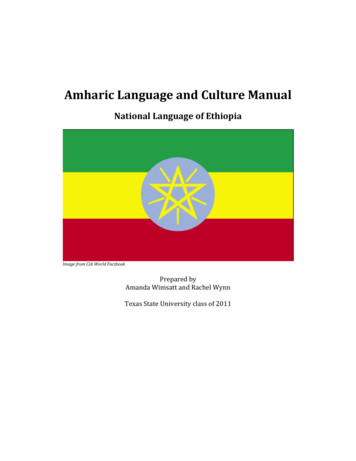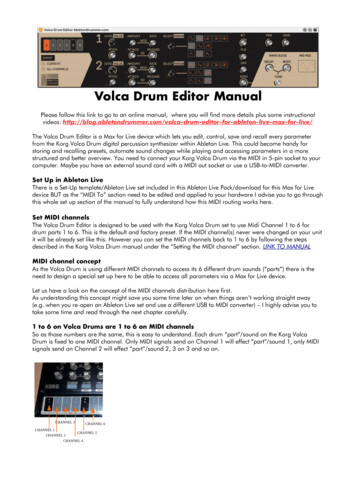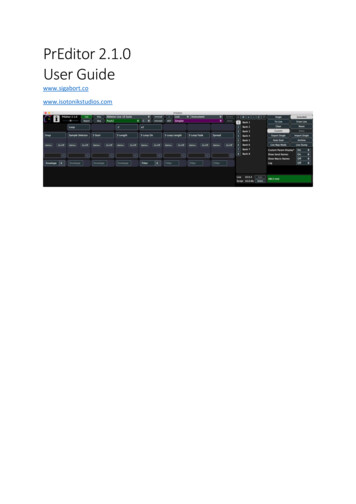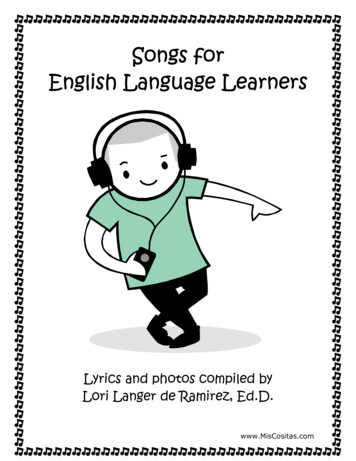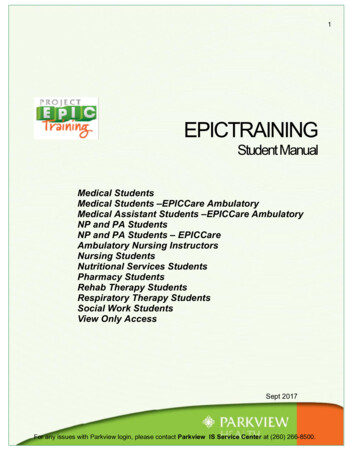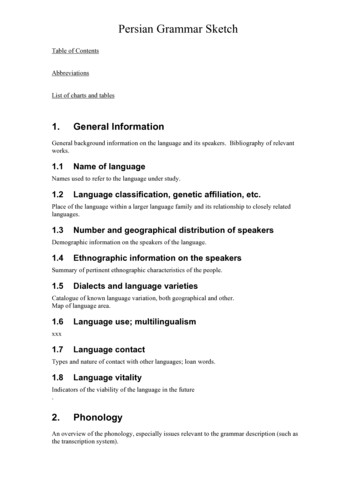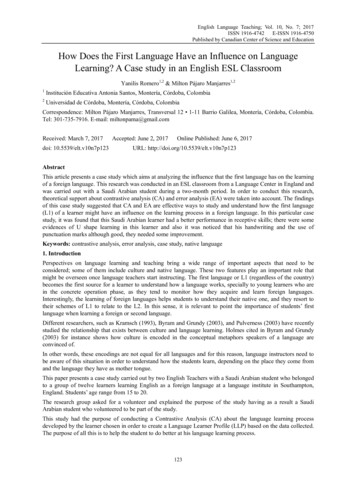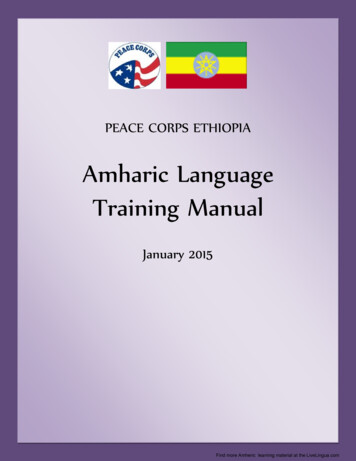
Transcription
Peace Corps EthiopiaAmharic Language ManualPEACE CORPS ETHIOPIAAmharic LanguageTraining ManualJanuary 2015IntroductionPage 1 of 207Find more Amheric learning material at the LiveLingua.com
Peace Corps EthiopiaAmharic Language ManualIntroductionAcknowledgmentsThe first edition of this Amharic Language Training Manual was developed by EseyneshFantahun and Ato Mekonnen Lemma in 2009 with editing of Group1 PCVs.Then the manual wasedited by Group 1 PCVs And revised in 2010,in 2013 and then in 2014 with the great input fromthe Language and Cultural Facilitators, and PCTs and PCVs comments and suggestions.We thank all who have given their input for the improvement of this manual, which is a valuablecontribution to the overall efforts of improving Peace Corps training resources.This is a work in progress, and we welcome advice and comments from all sides: trainers,trainees, volunteers, PC staff and others.Language and Cross Culture Training UnitPeace Corps EthiopiaNovember, 2014IntroductionPage 2 of 207Find more Amheric learning material at the LiveLingua.com
Peace Corps EthiopiaAmharic Language ManualIntroduction . 2Unit 1: Guide to Pronunciation . 4Unit 2: Greetings and Leave Taking . 9Unit 3: Introducing Oneself . 18Unit 4: Introducing Others . 29Unit 5: Amharic Verbs . 41Unit 6: Basic Shopping . 52Unit 7: Food and Drink . 61Unit 8: Telling Time . 75Unit 9: Telling a Story . 87Unit 10: Finding Your Way Around . 103Unit 11: Shopping II . 117Unit 12: Months Seasons and the Weather . 128Unit 13: Sentence Structure . 134Unit 14: Appointments and Invitations . 143Unit 15: Dealing with Harassment . 154Unit 16: Personal Health and Wellbeing . 159Unit 17: Personal Safety . 165Unit 18: Describing the Household. 172Unit 19: Job Spectific Vocabulary . 179Unit 20: Guide to Ongoing Learning . 188Appendix . 199IntroductionPage 3 of 207Find more Amheric learning material at the LiveLingua.com
Peace Corps EthiopiaAmharic Language Manual“If you talk to a man in a language he understands, that goes to his head: Ifyou talk to him in his language that goes to his heart”. Nelson MandelaUnit 1: Guide to PronunciationTwo Legged Lettersst1 order2nd order3rd order4th order5th order6th order7th iጻs’aጼs’eጽs’ïጾs’oKey to Amharic vowel soundsaFather, like the exclamationah!äAgain’ bigger, like the hesitation uheGate, wayuMoon, soonïLike playerIFeet, meet, seatOShoreUnit 1: Guide to PronunciationPage 4 of 207Find more Amheric learning material at the LiveLingua.com
Peace Corps EthiopiaAmharic Language Manualthe ሸ/ š is pronounced as the ‘sh’ sound in ‘shoe’the ጰ/ p’ä in this sound is an exploding bilabial ‘p’the ዠ/ žä is pronounced as the ‘s’ sound in ‘leisure’the ጸ/ s’ä in this sounds are exploding glottalized ‘s’The three-legged ��ጦጮhot’očo’the ጠ/ t’ä in this sound is an exploding glottalized ‘t’the ጨ/ č’ä in this sound is an exploding glottalized ‘ch’The legless ��feፍfïፎfothe ፀ/ s’ä in this sounds are exploding glottalized ‘s’Unit 1: Guide to PronunciationPage 5 of 207Find more Amheric learning material at the LiveLingua.com
Peace Corps EthiopiaAmharic Language ManualThe Uni-legged puፒpiፓpaፔpeፕpïፖpoGuide to Pronunciation:-wa sounds: ሏ-lwa ሟ-mwa ሧ- swa ሯ-rwa ሷ-swa ሿ-šwa ቋ-k’wa ኋ-hwa ኗ-nwa ኟ-ňwa ኳ-kwaዟ-zwa ዧ-žwaዷ-dwa ጇ-jwa ጓ-gwa ጧ-t’wa ጯ- č’wa ጿ- s’wa ò - fwaExample in Amharic �s’Vowel Sounds:k’ä n; k’olo; k’es(Cognac) säňňo, baňňo(Leisure) gäži, yaži, räžimmät’ät’at, t’ät’a, t’ot’ač’aka, č’äw, č’atlap’is, ityop’ya, p’ap’ass’älot, mänäs’їr, s’ägurä again, bigger, like the hesitation uh; very susceptible to surrounding lettersu moon, soon, tuneI feet, meet, seata father, like the exclamation ah!e gate, way, but slightly less elongatedUnit 1: Guide to PronunciationPage 6 of 207Find more Amheric learning material at the LiveLingua.com
Peace Corps EthiopiaAmharic Language Manualï susceptible to letters around it, but typically short like playero shore, war; but often pronounced as if “wo”Symbols: He or it (for masculine i.e. ‘male’ gender objects) She or it (for feminine i.e. ‘female’ gender objects)Definitions:Affix: a generic term used for both prefixes and suffixes (syllables having a meaning)Direct Object: the noun (pronoun) that receives the action expressed by the verb. “She bouncedthe ball (ball is the object)Explosives: the popping/clicking sound made in the mouth/throat when pronouncing word suchas ቆሎ k’oloGerund: the form of the verb used as a noun; “Swimming is good exercise”‘Swimming’ is a gerund because it is a verb used as a nounImperative: ordering someone to do something; ‘Open the door’ ‘Cook the potatoes’ ‘Sitdown’.Interrogative: the form used for questioningInfinitive: the form of the verb used as a noun – often used as a gerund. Infix: used after theroot and before the suffixPassive form: the form in which object becomes subjectActive: He cooked the chickenPassive: The chicken was cooked (passive)Prefix: a syllable attached at the beginning of a root word to change its meaningRoot: a basic form of a word to which affixes are addedSubject: the performer (doer) of an action ‘She went home’ (the subject is she)Suffix: a syllable attached to the end of a root word to change its meaningUnit 1: Guide to PronunciationPage 7 of 207Find more Amheric learning material at the LiveLingua.com
Peace Corps EthiopiaAmharic Language ManualGrammar Terms (English/Amharic):Noun: ስም sïmParagraph: አንቀፅ ank’äs’Sentence: አረፍተ ነገር aräftä nägärVerb: ግስ gïsWord: ቃል k’alPunctuation Terms (English/Amharic):(Functional equivalence)Period/Full stop: አራት ነጥብ arat nät’ïb (::)Question mark: ጥያቄ ምልክት t’ïyak’e mïlïkït (?)Exclamation mark: የቃል አጋኖ ምልክት yäk’al agano mïlïkït (!)Comma: ነጠላ ሰረዝ nät’äla säräzA Note on Verbs:In this manual, we will present all verbs using both the infinitive and the third person masculinesimple past form. Note that in Amharic dictionaries, verbs are generally listed according to thethird person masculine simple past form.Palatalization:In the second-person feminine, the final consonant of the verb root “palatalizes,”following apattern:ጠ t’ደ dተ tሰ sዘzነ nለ lč’ጀ jቸčሸšዠžኘňየyጨUnit 1: Guide to PronunciationPage 8 of 207Find more Amheric learning material at the LiveLingua.com
Peace Corps EthiopiaAmharic Language ManualUnit 2: Greetings and Leave TakingLearning ObjectivesAt the end of this unit you will be able to,Use greetings and leave takings appropriate to age, gender, and time of dayDemonstrate an understanding of the cultural aspects of greetings and leave-takings,including body languaget enayïst ïlïň!Unit 2: Greetings and Leave TakingPage 9 of 207Find more Amheric learning material at the LiveLingua.com
Peace Corps EthiopiaAmharic Language ManualDialog 1Greeting a Community Member.Lindsay, a female PCV, greets Ato* Kebede, her host family father, in the morning.AmharicLindsay:እንደምን አደሩ ïndämïn addäru?Ato Kebede: ደህና እግዚአብሔር ይመስገን dähna, ïgziabïher yïmmäsgän. ደህናአደርሽ? dähna adärš?Lindsay:ደህና እግዚአብሔር ይመስገን dähna, ïgziabïher yïmmäsgän.EnglishLindsay:Good morning. (Lit. How you spend the night?)Ato Kebede: Fine, God be thanked. Good morning. (Lit. Did you spend the night well?)Lindsay:Fine, God be thanked.* ( አቶ) Ato is an Amharic title meaning “Mister”.Cultural NoteGreetingsGreeting plays a critical role in speeding up your assimilation to the community. Eventhough the way Ethiopians greet each other might differ slightly from region to region orplace to place, it is always an important part of social interaction. Sometimes the greetingmay extend to asking after families, cattle, sheep, crop yield, weather conditions, etc. It isalso common, particularly in the countryside, to greet someone who you don’t know.While greeting and taking leave, bowing, shaking hands and removing hats are common.Kissing one another’s cheeks is also practiced, especially upon meeting after an extendedperiod of time. Using both hands when shaking hands with elders and officials indicatesrespect (the left hand to support the right forearm OR put both hands on the elder’s hand).Young people in Ethiopia will typically greet each other by shaking hands and bumpingshoulders.Raising the eyebrows is sometimes used to greet someone in a situation in which someonedoesn’t want or is unable to talk, or in a situation in which the two people are veryfamiliar with one another.Upon the entry or arrival of elders or officials, it is customary to stand and say, nor(signifying welcome and respect). The person arriving would respond, በ ግ ዜ ር bägzer(lit. “by God”). Not leaving a seat for respected or elder people shows disrespect. Also,putting hands in your pockets while talking with elders shows disrespect.Unit 2: Greetings and Leave TakingPage 10 of 207Find more Amheric learning material at the LiveLingua.com
Peace Corps EthiopiaAmharic Language ManualGreetings can be replied to by saying እግዚአብሔር ይመስገን ïgziabher yïmmäsgän. A personwill be happy if you call her or him by name while greeting.Useful Phrases for GreetingGeneral greetings make use of the present-tense verb, “to be” (መሆን mähon):PersonAmharicVerb “to be”Example ( fine.)Pronounእኔ ïne(እኔ ïně) ደህና ነኝ? dähna näň.Iነኝ näňYou ( )አንተYou ( )አንቺYou sswaናት/ነች nat/ näčHe/She �ት u all uናቸው(አንተ antä) ደህና(አንቺ anči) ደህና(እሷ ïssua) ደህናናቸውnaččäwPersonYou ( )ነሽ ?dähna näš?ናት/ነች?dähna nat/näč?(እሳቸው ïssaččäw) ደህና ናቸው? dähnanaččäw?(እኛ ïňňa) ደህና ነን? dähna nän.ነን nännaččïhunäh?(እርስዎ ïrswo) ደህና ነዎት? dähnanäwot?(እሱ ïssu) ደህና ነው? dähna näw?naččäwናችሁነህ? dähna(እናንተïnnantä) dähna ደህና ናችሁ?naččïhu?(እነሱ ïnnässu) ደህና ናቸው? dähnanaččäw?How are you? / Are you fine?እንደምን ነህ ? ïndämïn näh? /ደህና ነህ?dähna näh?እንደምን ነሽ? ïndämïn näš? /ደህና ነሽ ?You ( )dähna näš?እንደምን ነዎት? ïndämïn näwot? / ደህናYou (polite)ነዎት?dähna näwot?You all (plural) እንደምን ናችሁ? ïndämïn naččïhu? /ደህና ናችሁdähna naččïhu?Fine / I am fine / We are fineደህና dähna. / ደህና ነኝ dähnanäňደህና dähna / ደህና ነኝ dähnanäň.ደህና dähna / ደህና ነኝ dähnanäň.ደህና dähna / ደህና ነን dähna nän.General Greetings (Sälamtawoč)t enayïst ïlïň! . [formal, for all persons & all times] May God give you health.sälam näw? [informal, all persons & times] Is everything okay? (Lit. Is it peace?)አማን ነው? aman näw? [informal, all persons & times] Is everything okay? (Lit. Is it peace?)ጤና ይስጥልኝሰላም ነው?Unit 2: Greetings and Leave TakingPage 11 of 207Find more Amheric learning material at the LiveLingua.com
Peace Corps EthiopiaAmharic Language ManualGrammar PointAs you read through the following charts, pay attention to how the suffixchanges for each personal pronoun (in bold).Time-Specific GreetingsGenerally, morning is from awakening until noon, afternoon is from lunch untilapproximately the end of the work day/sunset, and evening is after work is over until bedtime.PersonYou( )You( )You(polite)You all(plural)ጠዋትt äwat/morning(ማደር/ madär)እንደምን / ደህና/ አደርክ?ïndämïn / dähna addärk?እንደምን / ደህና/ አደርሽ?ïndämïn / dähna addärš?እንደምን / ደህና/ አደሩ?ïndämïn / dähna addäru?እንደምን / ደህና/ አደራችሁ?ïndämïn / al)እንደምን / ደህና/ ዋልክ?ïndämïn / dähna walk?እንደምን / ደህና/ ዋልሽ?ïndämïn / dähna walš?እንደምን / ደህና/ ዋሉ?ïndämïn / dähna walu?እንደምን / ደህና/ ዋላችሁ?ïndämïn / dähna �ät)ምሽትከሰዓት በኋላ/ ደህና/ አመሸህ?ïndämïn / dähna amššäh?እንደምን / ደህና /አመሸሽ?ïndämïn/ dähna amäšäš?እንደምን / ደህና/ አመሹ?ïndämïn/ dähna amäššu?እንደምን / ደህና/ አመሻችሁ?ïndämïn / �ይመስገን ïgziabïheraddärachihuደህና d ähna.yïmmäsgän. Praise to God.Fine.We are fine.ነ ው dähna näw. He is fine.ናት/ነች dähna nat/näč. She is fine.ደህና ነን dähna nän.ደህናደህናደህና እግዚአብሔር ይመስገን፡፡ ደህና �? dähna,ïgziabïher yïmmäsgän.dähna addärk/addärš/addäru/addäraččïhu?General Leave-Taking:Leaving for an Extended PeriodPersonYou ( )You ( )Take care (Lit. Be well.)አንተአንቺYou (polite)ደህና ሁን dähna hun.antäደህና ሁኚ dähna huňi.ančiእርስዎYou all (plural)ïrswoእናንተïnnantäUnit 2: Greetings and Leave Takingደህና ይሁኑ/ ሁኑ dähna yïhunu.(hunu).ደህና ሁኑdähna hunu.Page 12 of 207Find more Amheric learning material at the LiveLingua.com
Peace Corps EthiopiaAmharic Language ManualPracticeUsing the pictures below, fill in the blank to complete the time specific greetings.አንተ antäአንቺ ančiእርስዎ ïrswoእናንተ ïnnantäአንተ antäአንቺ ančiእርስዎ ïrswoእናንተ ïnnantäአንተ antäአንቺ ančiእርስዎ ïrswoእናንተ ïnnantäUnit 2: Greetings and Leave TakingPage 13 of 207Find more Amheric learning material at the LiveLingua.com
Peace Corps EthiopiaAmharic Language ManualTime-Specific Leave-TakingPersonጠዋትt äwat morning(መዋል mäwal)አንተantäደህና ዋልdähna walአንቺAnčiደህና ዋይdähna �ና ዋል/ይዋሉ dähnawalu/yïwaluደህና ዋልdähna �ät)ደህና አምሽ dähna amšከሰዓት በኋላደህና �/ madär)ደህና እደርamšiደህና እደሪ/ ያምሹdähna amšu/ yamšuደህና አምሹ dähnaamšuደህና እደርደህና አምሹdähna ïdärdähna ïdäri/ ይደሩdähna ïdäru / yïdäruደህና እደርdähna ïdäruPracticeResponding to Greetings and Leave-Taking. How would you respond to the followinggreetings or leave-takings?1. እንደምን አደርክ/አደርሽ? ïndämïn addärk? / addärš?2. ደህና ናችሁ? dähna naččïhu?3. ደህና እደር / እደሪ dähna ïdär / ïdäri.4. ደህና ሁን / ሁኚ dähna hun / huňi.PracticeGreetings and Leave-Taking Role-Plays. What would you say in each of the followingsituations?1. You are meeting an elderly person of the community for the first time.2. At a morning meeting, you are asked to come to the front of the room, and greet theentire audience.3. You are speaking to a young, male shopkeeper in the afternoon.4. You are saying goodbye to your LCF at the end of the day.5. You are greeting a female counterpart who has come to visit your house in theafternoon.6. You are going to bed and saying goodnight to your host family.7. You take leave of a group of neighborhood children during the morning.Unit 2: Greetings and Leave TakingPage 14 of 207Find more Amheric learning material at the LiveLingua.com
Peace Corps EthiopiaAmharic Language ManualGrammar PointGreetings and leave-takings in Amharic make use of three verbs:Amharicማደር madär [addärä]መዋል mäwal [walä]ማምሸት mamšät [amäššä]EnglishTo spend the nightTo spend the dayTo spend the eveningGreetingsGreetings are formed with the past-tense of these verbs (see Unit 10 for further details on därk?how did you ( ) spend the night?ደህና dähna ዋልሽ? walš?well did you ( ) spend the day?እንደምን ïndämïnአመሻችሁ? amäššaččïhu?how did you (plural) spend the evening?The past-tense conjugations of these verbs have been utilized in the greeting charts givenabove. Refer to these charts and notice the pattern of changing suffixes for each personalpronoun.Leave-takingsLeave-takings are formed with the imperative form of these verbs.ደህና dähnaእደሩ„ ïdäru.well spend the night (plural or polite)dähna ዋይ way(i).well spend the day ( )ደህናደህናwelldähna አምሽ amš.spend the evening ( )The imperative forms of these verbs have been utilized in the leave-taking charts givenabove. Refer to these charts and notice the pattern of changing suffixes for each personalpronoun.Unit 2: Greetings and Leave TakingPage 15 of 207Find more Amheric learning material at the LiveLingua.com
Peace Corps EthiopiaAmharic Language ManualNote: In Amharic sentences, the verb almost always comes last.subjectእኔ ïneI(subject) (object/modifier/descriptor)ደህና dähnafine(modifier) verbነኝ näň.am(verb)Note: Since the verb indicates the subject, and is therefore redundant, the initial pronoun canoften be dropped, unless we want to add emphasis or intend to indicate contrast with anotherperson. (ደህና ነኝ dähna näň or እኔ ደህና ነኝ ïne dähna näň ).PracticeThe Verb “to be”Given the Amharic pronoun, provide the correct form of the verb “to be”.1.2.3.4.ïsswa dähnaእኛ ደህና ïňňa dähnaእነሱ ደህና ïnnässu dähnaአንቺ ደህና anči dähnaእሷ ደህና?.?5.6.7.8.ïrswo dähna?እኔ ደህና ïne dähna.አንተ ደህና antä dähna?እናንተ ደህና ïnnantä dähna ?እርስዎ ደህናDialog 2Meeting Friends on the StreetMark, a male PCV, sees his friends, Mekonen and Tigist, on the street, in the k:Friends:ደህና ዋላችሁ? dähna walaččïhu?እግዚአብሔር ይመስገን ደህና ዋልክ? dähna, ïgziabïher yïmmäsgän. dähna walk?እንደምን ናችሁ?ደህና ናችሁ dähna Ïndämïn naččïhu? dähna naččïhu?ደህና ነን dähna nän.እሺ ቻው ደህና አምሹ Ïšši. čaw, dähna amïšu.አሜን ደህና አምሽamen, dähna :Good afternoon (to you both).Fine, praise God. Good afternoon.Fine. How are you (both)? Are you (both) fine?We are fine.Okay. Bye, good evening.Amen, good evening.Unit 2: Greetings and Leave TakingPage 16 of 207Find more Amheric learning material at the LiveLingua.com
Peace Corps EthiopiaAmharic Language ManualPracticeComplete the following blank spaces with the appropriate greeting expressions.Pronounsጠዋት t’äwatምሽት mïššïtከሰዓት በኋላkäsä’at bähwalaGeneral greetingantäančiïrswoïnantäApplicationGreet the different members of your host family, both individually and as a group. Take leave ofthem, as appropriate, throughout the day. During the next class, discuss the specific greetingsand leave-takings that you used. How did they respond?Glossary:dähnaïgzïabhär yïmäsgänt’ena yïstïlïňdähna natdähna nänt’äwatkäsäatmïšïtsälam �ር ይመስገንጤና ይስጥልኝደህና ናትደህና ነንጠዋትከሰአትምሽትሰላም ነው?ማደርመዋልማምሸትfineGod be thanked (praise to God)may God give you healthshe is finewe are finemorningafternooneveningis everything okay?to spend the nightto spend the dayto spend the eveningPractice Reading and Pronouncing Script:አዲስ አበባአሰላዱላዳቦ ቤትደብዳቤኮካ ኮላጅብካኪUnit 2: Greetings and Leave TakingPage 17 of 207Find more Amheric learning material at the LiveLingua.com
Peace Corps EthiopiaAmharic Language ManualUnit 3: Introducing OneselfLearning objectivesBy the end of this unit, you will be able to,Introduce yourself stating your nationality, occupation, and marital statusAsk others for personal information: about place of origin, occupation,and marital statusUse the verbs ‘to be called’ as in, what’s your name? (Lit. What do they call you?)Use possessivesPluralize nounsGrammar PointConjugation of verb “to be called” መባል mäbbal [ተባለ täbalä]Conjugation of verb “to be called” መባል mäbal [ተባለ täbbalä] (present tense)(Note: We will look at the present tense conjugation in more detail in Unit 9.)Pronounእኔ ïneአንተ antäአንቺ ančiእርስዎ ïrswoእሱ ïssuእሷ ïsswaእሳቸው ïssačäwNäťäla/Singularእባላለሁ ïbbalallähuትባላለህ tïbbalallähትባያለሽ tïbbayalläšይባላሉ yïbbalalluይባላል yïbbalalትባላለች tïbbalalläčይባላሉ yïbbalalluBïzu/Pluralእኛ lačhuይባላሉyïbbalalluVocabularyWords Denoting Nationality (ዜግነት zegïnät)To form nationality adjectives we add - ዊ wi (male) or - ውያን wïyan. Look at the following examples:CountryMale-Singularዊትwit (female). The plural form �ïtyop yaityop yawiityop yawitityop it 3: Introducing OneselfPage 18 of 207Find more Amheric learning material at the LiveLingua.com
Peace Corps EthiopiaAmharic Language ManualGrammar PointConjugation of ማግባትmagbat [አገባ agäba] to marryAffirmativePronounእኔ ïneአንተ antäአንቺ ančiእርስዎ ïrswoእሱ ïssuእሷ ïssuaእሳቸው uralእኛ ��ምalagäbumBïzu/Pluralእኛ vePronounእኔ ïneአንተ antäአንቺ ančiእርስዎ ïrswoእሱ ïssuእሷ ïssuaእሳቸው lagäbačïhumአላገቡምalagäbumNote: ፍቺ fiči/divorce (ተፋትቻለሁ täfatïčalähu. I am divorced)The affirmative forms make use of what is called the “compound gerunditive” tense, which isliterally translated like, “I have married,” “You have married,” “They have married,” etc. Youcan see this tense outlined in more detail in the Grammar Appendix, and also in the Grammarpoint in Unit 17.The negative forms make use of the negative past tense form, which is translated literally, “I didnot marry,” “You did not marry,” “They did not marry,” etc. This form is discussed in detail inUnit 10. In brief, the negative form of the past is marked by the prefix አል-al- and the suffix -ም –m attached to the positive form of the past tense verb. Notice in the chart above how the verbstem “አገባ agäba” changes within the al- and –m affixes. In the underlined bits, you shouldrecognize the patterns that you have seen in greetings in the previous unit.Note: Prefixes are syllables with meaning added at the beginning of a word, and suffixes atthe end. The word “affix” is used for both prefixes and suffixes.Unit 3: Introducing OneselfPage 19 of 207Find more Amheric learning material at the LiveLingua.com
Peace Corps EthiopiaAmharic Language ManualIntroducing YourselfLook at the photos of the following celebrities (some of them are Ethiopians). Assume thatthey are introducing themselves to you in Amharic. Read their self-introductions givenbelow:1Haile Gebreselassie (Ethiopian Long Distance Runner/ Rwač )ሃይሌ ገ/ስላሴ አባላለሁ፡ ኢትዮጰያዊ ነኝ፣Haile Gebreselassie ïbaalallähu. Ityop yawi näñ.ሯጭ ነኝ፡ rwač näñ.አግብቻለሁ፡ agïbïčallähu.ባለቤቴ ወ/ሮ አለም ትባባለች፡፡ baläbete Wäyzäro Alem tïbbalalläč.2Jennifer Lopezጄኒፈር ሎፔዝ እባላለሁJennifer Lopez ïbbalalähu.አሜሪካዊት ነኝ፡ amerikawit näñ.ዘፋኝ ነኝ፡zäfañ ች አሉኝ lïjoč aluň3Mary Smithሜሪ ስሚዝ እባላለሁ፡ Mary Smith ïbbalallähu.አሜሪካዊት ነኝ፡ amerikawit näñ.ሐኪም ነኝ hakim näñ.አላገባሁም፡ alagäbahum.PracticeReread the self-introductions and complete the information in the tables below. Some ofthe information has been filled in for you.Haile ��ግነትስራ sïra/occupationየጋብቻ ሁኔታyägabïčča huneta/marital statusኢትዮጵያዊ ïtyop yawiJennifer LopezስምsïmJennifer LopezUnit 3: Introducing Oneselfዜግነት zegïnätስራዘፋኝsïraየጋብቻ ሁኔታyägabïčča hunetazäfañPage 20 of 207Find more Amheric learning material at the LiveLingua.com
Peace Corps EthiopiaAmharic Language ManualMary Smithስምsïmዜግነት zegïnätስራsïraየጋብቻ ሁኔታyägabičča hunetaCultural NoteTitles (ማዕረግ Ma’ïräg)The ordinary title for adult men in Amharic is አቶ ato (equivalent to the English ‘Mr.’). Theordinary title for married women is ወይዘሮ wäyzäro and for unmarried women ወይዘሪትwäyzärit. There is no equivalent for Ms in Amharic. When in doubt, it is generallyacceptable to ask the addressee which of the two titles ወይዘሮ wäyzäro or ወይዘሪት wäyzäritthey prefer.Inquiring About Marital StatusEthiopians will commonly ask you about your marital status. This however, is not verycommon amongst Ethiopians themselves. If someone of the opposite sex asks your maritalstatus, it may or may not mean that they are interested in having a relationship with you.Sometimes people are simply curious!Grammar PointThe Possessive Adjective “My” (first method)To form the possessive for first person (my), add “-e” to the noun if it ends in a consonantor “-ye” if it ends in a vowel. Look at the followingስም sïm name ስሜ sïme my name አገር agär country አገሬ agäre my country ቤትbet house ቤቴ bete my house ስራ sïra job/work ስራዬ sïraye my job/workዜግነት zegïnät nationality ዜግነቴ zegïnäte my nationalityእድሜ ïdme age እድሜዬ ïdmeye my agePluralizingTo pluralize, you add ኦች/ oč if the noun ends in a consonant, and /ዎችwoč if it ends in a vowel.The possessive marker goes on the end of the pluralized word.SingularPluralPlural Possessiveልጅlïj childልጆችlïjoč childrenልጆቼ lïjoče my childrenውሻwïša dogውሻዎች Wïšawoč dogsውሻዎቼwïšawoče my dogsድመት dïmmät catድመቶች dïmätoč catsድመቶቼ dïmätoče my catsNote: ውሻዎቼ wïšawoče may become ውሾቼ wïšoče for short. This is especially common fornouns ending in –a ( 4th order).Examples:- leba -- lebočt’äbäk’a -- t’äbäk’očaläk’a -- aläk’očUnit 3: Introducing OneselfPage 21 of 207Find more Amheric learning material at the LiveLingua.com
Peace Corps EthiopiaAmharic Language ManualልጄlïjeቤቴbeteGrammar PointThe Possessive Adjectives (first method)Now that you have learned the suffix to indicate “my”, study the followingchart of suffixes to indicate possession by each personal pronoun.Pronounእኔ ïneአንተ antaአንቺ ančiእርስዎ ïrswoእሱ ïssuእሷ ïsswaእሳቸው ው agäraččäwTo form the possessive forthe following examplesስም sïm አገር agär ቤት bet ዜግነት zegïnät ስራ sïra Unit 3: Introducing OneselfBïzu/Pluralእኛ huአገራቸውagäraččäw“your” and , add ‘ïh’ for male and ‘ïš’ for female. Look atስምህ sïmïh (male) / ስምሽ sïmïš (female)አገርህ agärïh (male) / አገርሽagärïš (female)ቤትህbetïh (male) / ቤትሽ betïš (female)ዜግነትህ zegïnätïh (male) / ዜግነትሽ zegïnätïš (female)ስራህ sïrah (male) / ስራሽ sïraš (female)Page 22 of 207Find more Amheric learning material at the LiveLingua.com
Peace Corps EthiopiaAmharic Language ManualIn general, the pattern of possessive suffixes is as follows:Pronounነጠላ näťäla/ብዙ Bïzu/PluralSingularእኔ ïneኤ-e or ዬ–yeእኛ ïññaአንተ antäህ - ïh/hእናንተ ïnnantäአንቺ ančiሽ - ïš/šእርስዎ ïrswoዎት/ዎ -wot/woእሱ ïssuኡ -u or ው -wእነሱ ïnnäsuእሷ ïsswaዋ -waእሳቸው ïssačäwአ ቸ ው -aččäwአችሁ-aččïhuአችሁ-aččïhuአ ቸ ው -aččäwExamples (mïsalewoč)1. አገርህ የት ነው? agärïh yät näw? What is the name of your country? (Lit. Where is yourcountry?)2. ስምሽ ማን ነው? sïmïš man näw? What is your name? (to a female person)3. ስራህ ምንድን ነው? sïrah mïndïn näw? What is your job/occupation/profession? (to a maleperson)PracticePluralize nouns or words you have learned so far.1. 2. 3. 4. 5. Unit 3: Introducing OneselfPage 23 of 207Find more Amheric learning material at the LiveLingua.com
Peace Corps EthiopiaAmharic Language ManualPracticeYou would like to elicit personal information from someone. Put your photo in the middle andwrite your questions as shown. You can add more questions to the chart.Dialog 1Read the dialog below. In the following situation, Hailu and Jeff have just met. What do they sayto each other?Hailu: እኔ ሃይሉ እባላለሁ፣ አንተስ?ïne Hailu ïbaalallähu. antäs?Jeff: እኔ ጄፍ እባላለሁïne Jeff ïbbalallähu.Hailu: አገርህ የት ነው?agärïh yät näw?Jeff: አገሬ አሜሪካ ነውagäre amerika näw.Hailu: እኔ አስተማሪ ነኝ ïne astämari näñ. አንተስ ስራህ ምንድን ነው? antäs, sïrah mïndïn näw?Jeff: እኔ መሃንዲስ ነኝ ïne mähandis näñ.Note: The suffix –s added to the end of a subject pronoun indicates “how about”, as in,“አንተስ antäs?” (“How about you (m.)?”).PracticeStudy the previous dialog and connect the sentences with gïn (but). Look at the example: ምሳሌïsale/example: ሃይሉ አስተማሪ ነው ፡፡ ጄፍ ግን መሃንዲስ ነው፡፡ Hailu astämari näw, Jeff gïn mähandisnäw.1. ሊያ ተማሪ ናት ሜሮን ግን Liya tämari nat Meron gïn .2. ያሬድ ዘፋኝ ነው አቤል ግን Yared zäfaň näw Abel gïn .3. ሄለን ጸኃፊ ናት ሰናይት ግን Helen s’ähafi nat senayt gїn .4. አባተ ሃኪም ነው እናኒ ግን abate hakim näw ïnani gïn .5. እሱ ፖሊስ ነው እሷ ግን ïssu polis näw ïsswa gïn .PracticeUse the appropriate possessive form to indicate that the following items belong to you.1. ቤትbet2. አስተማሪastämari3. ሃኪምhakimUnit 3: Introducing OneselfPage
The first edition of this Amharic Language Training Manual was developed by Eseynesh Fantahun and Ato Mekonnen Lemma in 2009 with editing of Group1 PCVs.Then the manual was edited by Group 1 PCVs And revised in 2010,in 2013 and then in 2014 with the great input from the Language and
